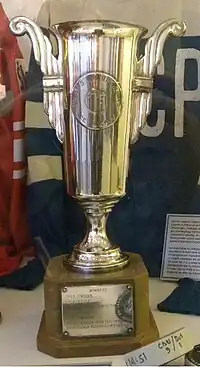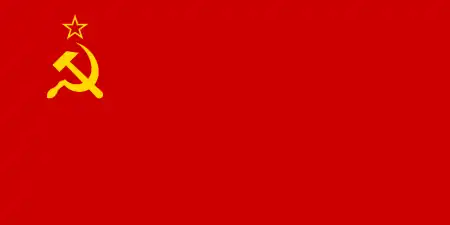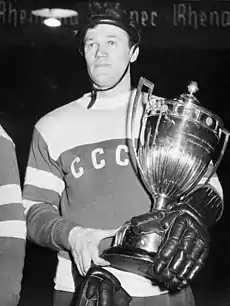Ice hockey at the 1956 Winter Olympics
The men's ice hockey tournament at the 1956 Winter Olympics in Cortina d'Ampezzo, Italy, was the eighth Olympic Championship, also serving as the 23rd World Championships and the 34th European Championships. The tournament was held at the Olympic Ice Stadium and the Apollonio Stadium.[1]
 | |
| Tournament details | |
|---|---|
| Host country | |
| Dates | 26 January – 4 February 1956 |
| Teams | 10 |
| Final positions | |
| Champions | |
| Runner-up | |
| Third place | |
| Fourth place | |
| Tournament statistics | |
| Games played | 33 |
| Goals scored | 262 (7.94 per game) |
| Attendance | 122,230 (3,704 per match) |
| Scoring leader(s) | |

East Germany and West Germany could not come to an agreement over how to formulate a combined team, so they played a qualification game against each other, which was won by West Germany. East Germany hosted a tournament for non-qualified teams, often referred to as World Championships Pool B, between GDR, Norway and Belgium in Berlin.[2]
The Soviets won all their games to claim their first Olympic title, their second World title, and their third European title. Canada, represented by the Kitchener-Waterloo Dutchmen, won its eighth consecutive Olympic ice hockey medal, and first bronze medal.
Medalists
Participating nations
.svg.png.webp) Canada (17)
Canada (17) Soviet Union (17)
Soviet Union (17) Sweden (17)
Sweden (17).svg.png.webp) United States (16)
United States (16)
World Championship Group A (Italy)
Qualification
- November 16, 1955
- East Germany 3-7 West Germany
First round
Top two teams (shaded ones) from each group earned a right to play for 1st-6th places.
Group A
| Pos | Team | Pld | W | L | D | GF | GA | GD | Pts |
|---|---|---|---|---|---|---|---|---|---|
| 1 | 3 | 3 | 0 | 0 | 30 | 1 | +29 | 6 | |
| 2 | 3 | 1 | 1 | 1 | 9 | 6 | +3 | 3 | |
| 3 | 3 | 0 | 1 | 2 | 5 | 7 | −2 | 2 | |
| 4 | 3 | 0 | 2 | 1 | 2 | 32 | −30 | 1 |
- January 26
- Canada 4–0 Germany (UTG)
- Italy 2–2 Austria
- January 27
- Italy 2–2 Germany (UTG)
- Canada 23–0 Austria
- January 28
- Germany (UTG) 7–0 Austria
- Italy 1–3 Canada
Group B
| Pos | Team | Pld | W | L | D | GF | GA | GD | Pts |
|---|---|---|---|---|---|---|---|---|---|
| 1 | 2 | 2 | 0 | 0 | 12 | 6 | +6 | 4 | |
| 2 | 2 | 1 | 1 | 0 | 7 | 4 | +3 | 2 | |
| 3 | 2 | 0 | 2 | 0 | 3 | 12 | −9 | 0 |
- January 27
- Czechoslovakia 4–3 USA
- January 28
- USA 4–0 Poland
- January 29
- Czechoslovakia 8–3 Poland
Group C
| Pos | Team | Pld | W | L | D | GF | GA | GD | Pts |
|---|---|---|---|---|---|---|---|---|---|
| 1 | 2 | 2 | 0 | 0 | 15 | 4 | +11 | 4 | |
| 2 | 2 | 1 | 1 | 0 | 7 | 10 | −3 | 2 | |
| 3 | 2 | 0 | 2 | 0 | 8 | 16 | −8 | 0 |
- January 27
- USSR 5–1 Sweden
- January 28
- Sweden 6–5 Switzerland
- January 29
- USSR 10–3 Switzerland
Final round

The first place team, the Soviet Union, won the gold medal; the silver medal was won by the United States, and the bronze medal was won by Canada.
Coming into the final game of the tournament (Soviet Union vs Canada), the Soviets and Americans both had eight points while Canada had six points. A Canadian win would have created a three-way tie at eight points, to be broken by goal ratio. Canada (23/9=2.556) needed a victory by three or more to pass the Soviets (23/5=4.600). The Soviets would remain ahead of Canada with a win, a draw, or a loss by one or two.
The Americans (26/12=2.167) still had a chance at all three medal places due to the possibility of the goal ratios of Canada and/or the Soviets being sufficiently reduced according to the score of the final game.[3][4]
| Pos | Team | Pld | W | L | D | GF | GA | GD | Pts |
|---|---|---|---|---|---|---|---|---|---|
| 1 | 5 | 5 | 0 | 0 | 25 | 5 | +20 | 10 | |
| 2 | 5 | 4 | 1 | 0 | 26 | 12 | +14 | 8 | |
| 3 | 5 | 3 | 2 | 0 | 23 | 11 | +12 | 6 | |
| 4 | 5 | 1 | 3 | 1 | 10 | 17 | −7 | 3 | |
| 5 | 5 | 1 | 4 | 0 | 20 | 30 | −10 | 2 | |
| 6 | 5 | 0 | 4 | 1 | 6 | 35 | −29 | 1 |
- January 30
- USA 7–2 Germany (UTG)
- Canada 6–3 Czechoslovakia
- USSR 4–1 Sweden
- January 31
- USSR 8–0 Germany (UTG)
- Sweden 5–0 Czechoslovakia
- USA 4–1 Canada
- February 1
- USA 6–1 Sweden
- February 2
- Canada 10–0 Germany (UTG)
- USSR 7–4 Czechoslovakia
- February 3
- Czechoslovakia 9–3 Germany (UTG)
- Canada 6–2 Sweden
- USSR 4–0 USA
- February 4
- USSR 2–0 Canada
- Germany (UTG) 1–1 Sweden
- USA 9–4 Czechoslovakia
Consolation round
| Pos | Team | Pld | W | L | D | GF | GA | GD | Pts |
|---|---|---|---|---|---|---|---|---|---|
| 7 | 3 | 3 | 0 | 0 | 21 | 7 | +14 | 6 | |
| 8 | 3 | 2 | 1 | 0 | 12 | 10 | +2 | 4 | |
| 9 | 3 | 1 | 2 | 0 | 12 | 18 | −6 | 2 | |
| 10 | 3 | 0 | 3 | 0 | 9 | 19 | −10 | 0 |
- January 31
- Switzerland 7–4 Austria
- February 1
- Poland 6–2 Switzerland
- Italy 8–2 Austria
- February 2
- Italy 8–3 Switzerland
- Poland 4–3 Austria
- February 3
- Italy 5–2 Poland
World Championship Group B (East Germany)
Final Round
| Pos | Team | Pld | W | L | D | GF | GA | GD | Pts |
|---|---|---|---|---|---|---|---|---|---|
| 11 | 2 | 2 | 0 | 0 | 18 | 8 | +10 | 4 | |
| 12 | 2 | 1 | 1 | 0 | 8 | 9 | −1 | 2 | |
| 13 | 2 | 0 | 2 | 0 | 12 | 21 | −9 | 0 |
- March 8
- East Germany 4–1 Norway
- March 9
- East Germany 14–7 Belgium
- March 10
- Norway 7–5 Belgium
Statistics
Average age
Gold medalists team USSR was the oldest team in the tournament, averaging 29 years and 11 months. Team USA was the youngest team in the tournament, averaging 22 years and 5 months. Tournament average was 26 years and 7 months.[5]
Leading scorers
| Rk | Team | GP | G | A | Pts |
|---|---|---|---|---|---|
| 1 | 8 | 7 | 8 | 15 | |
| 2 | 8 | 7 | 7 | 14 | |
| 3 | 7 | 9 | 3 | 12 | |
| 4 | 8 | 7 | 5 | 12 | |
| 5 | 8 | 9 | 2 | 11 | |
| 6 | 7 | 8 | 3 | 11 | |
| 7 | 7 | 6 | 4 | 10 | |
| 8 | 8 | 5 | 5 | 10 | |
| 9 | 8 | 1 | 8 | 9 | |
| 10 | 6 | 5 | 3 | 8 |
Tournament awards
- Best players selected by the directorate:
- Best Goaltender:
 Willard Ikola
Willard Ikola - Best Defenceman:
 Nikolai Sologubov
Nikolai Sologubov - Best Forward:
.svg.png.webp) Jack McKenzie
Jack McKenzie
- Best Goaltender:
Final ranking
European Championship final ranking
Citations
- "Ice Hockey at the 1956 Cortina d'Ampezzo Winter Games". Sports Reference. Archived from the original on 17 April 2020. Retrieved 13 May 2019.
- World 'B'
- "Jeux Olympiques de Cortina d'Ampezzo 1956 - Hockey sur Glace".
- Official Report p.676
- "Team Canada - Olympics - Cortina d'Ampezzo 1956 - Player Stats". QuantHockey. Retrieved 23 April 2020.
References
- Duplacey, James (1998). Total Hockey: The official encyclopedia of the National Hockey League. Total Sports. pp. 498–528. ISBN 0-8362-7114-9.
- Podnieks, Andrew (2010). IIHF Media Guide & Record Book 2011. Moydart Press. pp. 25–6, 30, 107–8.
- Jeux Olympiques d'Cortina d'Ampezzo 1956